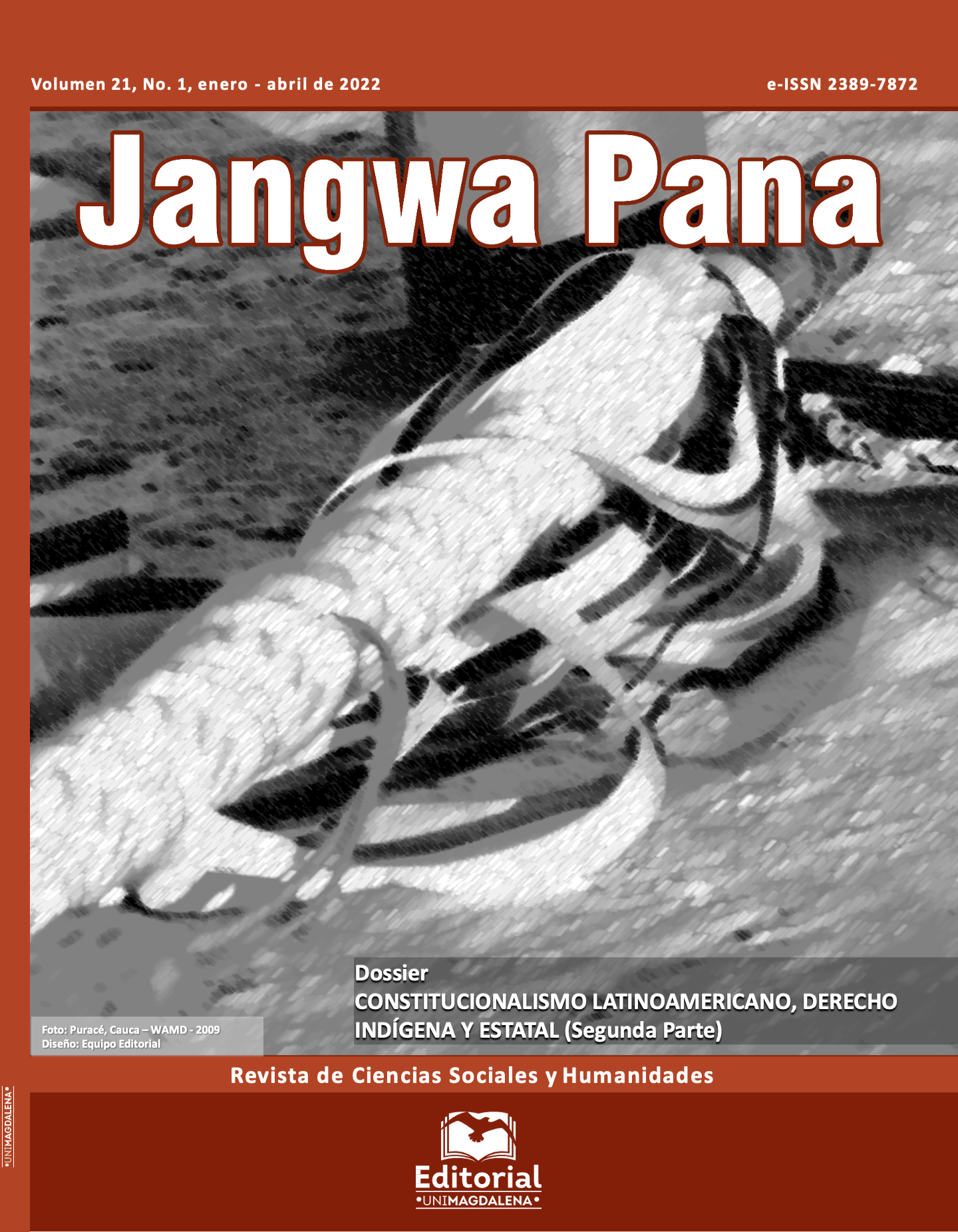Inalienability as the foundation of freedom and Indigenous right to veto. Intercultural translation in Ecuadorian and Colombian Constitutions
Main Article Content
Abstract
Downloads
Article Details
References
Anguie, A. (2005). Imperialism, Sovereignty and the Making of International Law. New York, Estados Unidos: Cambridge University Press.
Calabresi, G. y Melamed, A. D. (1972). Property Rules, Liability Rules and Inalienability: One View of the Cathedral. Harvard Law Review, 85, 1089 - 1128.
Césaire, A. (2006). Discurso sobre el colonialismo. Madrid, España: Ediciones Akal.
Beuchot, M. y Arenas-Dolz, F. (2008). Hermenéuticas de la encrucijada. Analogía, retórica y filosofía. Barcelona, España: Anthropos.
Figueroa, I. (2014). Soberanía nacional, pueblos indígenas y trauma civilizatorio en Colombia y Ecuador, Jurídicas, 1(11), 181-205.
Figueroa, I. (2016). Legislación marginal, desposesión indígena, civilización en proceso: Ecuador y Colombia, Nómadas, 45, 43-57.
Ferrajoli, L. (2000). El garantismo y la filosofía del derecho. Bogotá, Colombia: Universidad Externado de Colombia.
Kuflik, A. (1986). The Utilitarian Logic of Inalienable Rights. Ethics, 97(1), 75-87.
Naciones Unidas (2007). Declaración sobre los derechos de los pueblos indígenas, AG Res. 61/295, UN Doc A/61/L.7.
Naciones Unidas (1993). Comisión de Derechos Humanos, The right of everyone to own property alone as well as in association with others, Final report submitted by Mr. Luis Valencia Rodríguez, independent Expert, UN ESCOR, 49th Sess., UN Doc. E/CN.4/1993/15.
Pratt, M.L. (2008). Imperial Eyes: Travel Writing and Transculturation. Nueva York, Estados Unidos: Routledge.
Radin, M.J. (1987). Market-Inalienability. Harvard Law Review, 100, 1849-1937.
Rappaport, J. (2000). La política de la memoria: interpretación indígena de la historia en los andes colombianos. Popayán, Colombia: Editorial Universidad del Cauca.
Rose, C. M. (2004). “Economic Claims and the Challenge of New Property. En Katherine Verdery, Property in Question: Value Transformation in the Global Economy (pp. 275-296). Oxford, Engalnd: Berg Publishers.
Santos, B.S. (2009). Una epistemología del Sur. México D.F, México: CLACSO, Siglo veintiuno.
Smith, J. C. (1974). The Concept of Native Title. University of Toronto. Law Journal, 24, 1-16.
Taiaiaki, A. (2005). Sovereignty, En Joanne Barker (ed.), Sovereignty Matters (pp. 33-49). Lincoln, Estados Unidos: University of Nebraska.
Tapia, L. (2007). La igualdad es cogobierno. La Paz, Bolivia: Plural Editores.
Tapia, L. (2006). La invención del núcleo común. Ciudadanía y gobierno multisocietal. La Paz, Bolivia: La Muela del Diablo.
Tully, J. (1995). Strange Multiplicity. Constitutionalism in an age of diversity. Cambridge, Inglaterra: Cambridge University Press.
Safatle, V. (2020). O circuito dos afetos. Corpos políticos, desamparo e o fim do individuo. Belo Horizonte, Brasil: Autêntica.
Viveiros de Castro, E. (2015). Metafísicas canibais. São Paulo, Brasil: Cosac Naify.
Viveiros de Castro, E. (1996) “Os pronomes cosmológicos e o perspectivismo ameríndio”. Mana, 2(2), 115-144.
Walsh, C. (2009). Interculturalidad, estado, sociedad. Luchas (de)coloniales de nuestra época. Quito, Ecuador: UASB y Abya Yala.
Weiner, A. B. (1985). Inalienable Wealth. American Ethnologist, 12, 210-227.

